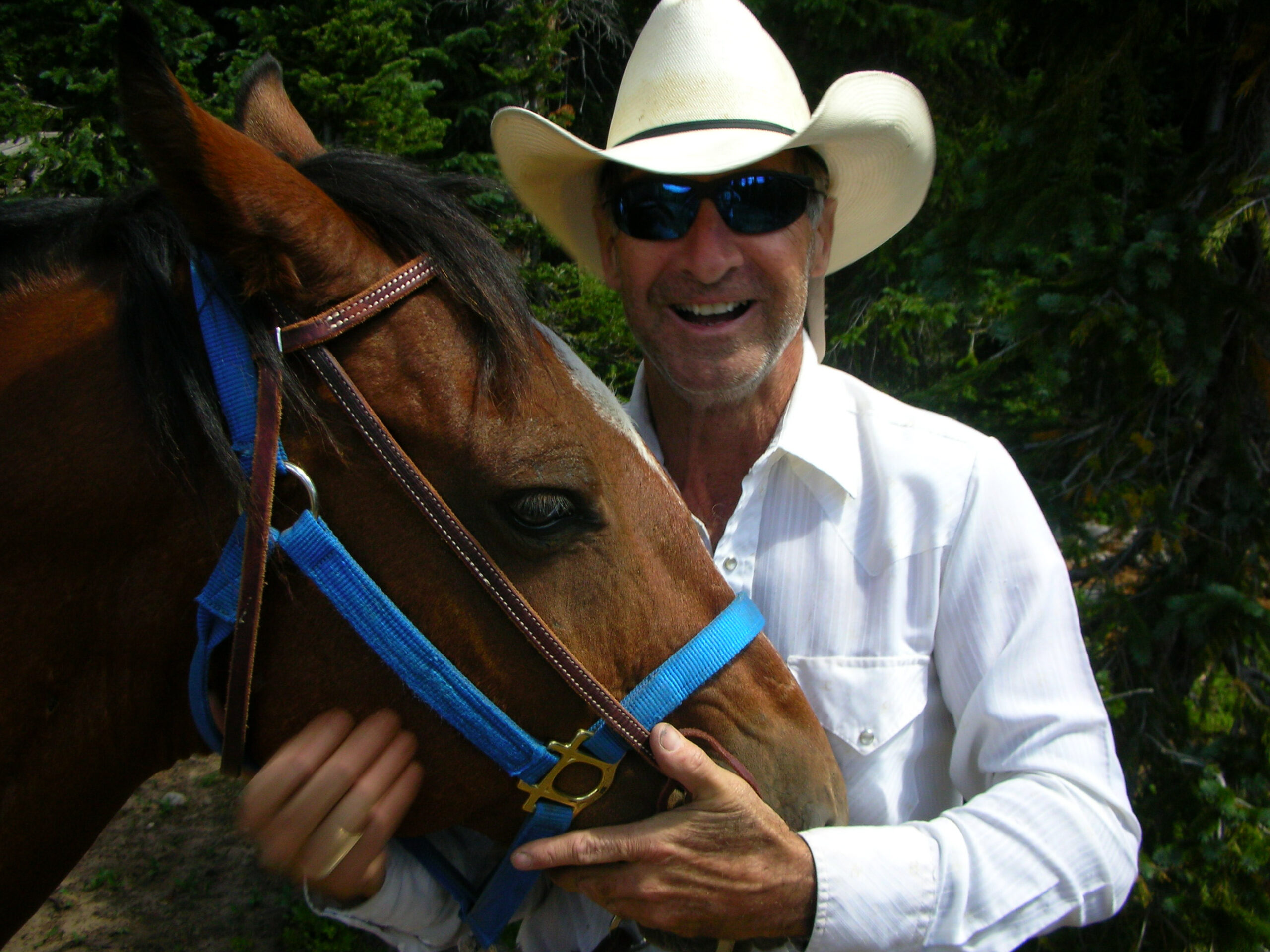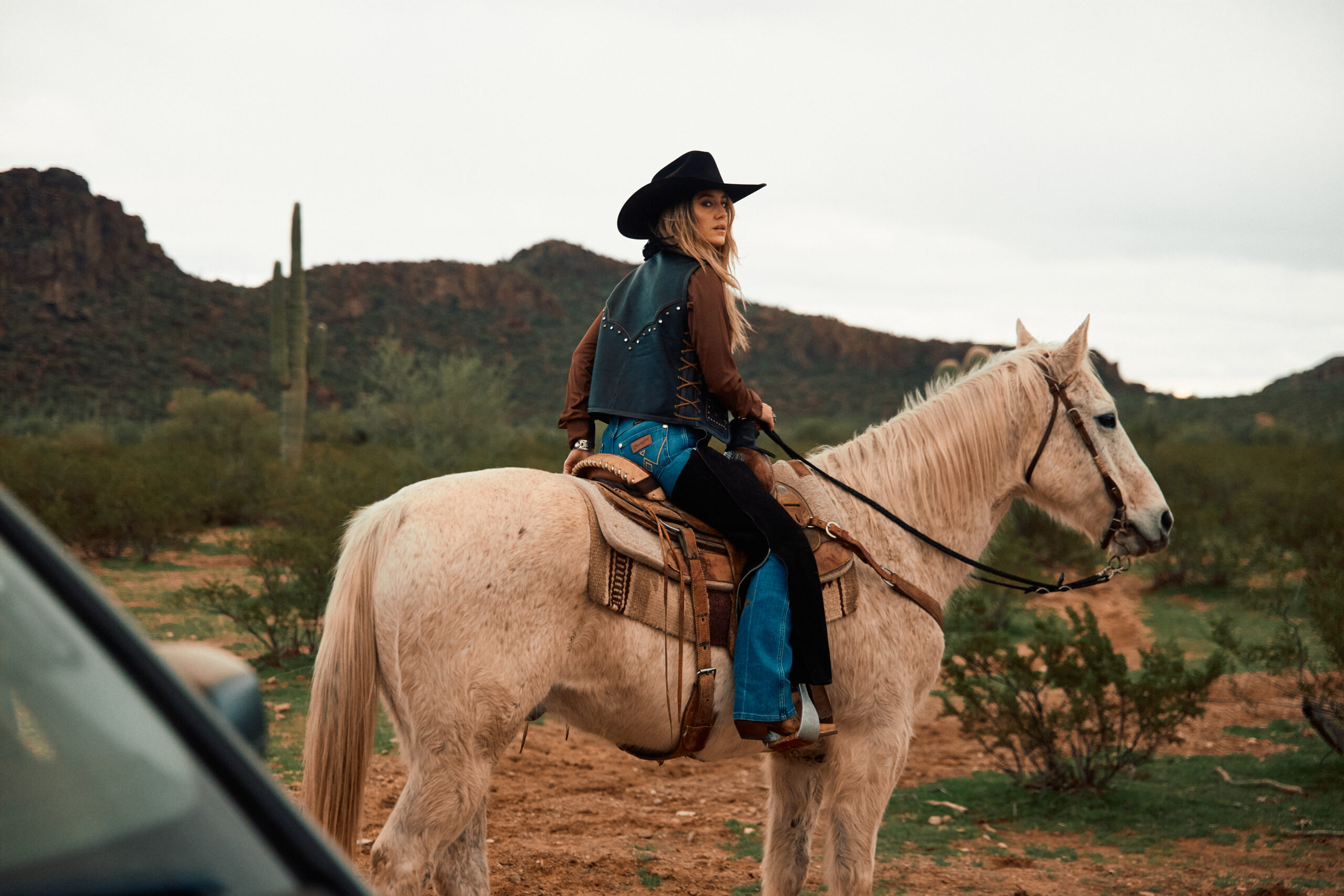Artist Woodard continues to lead pack-horse trips at 73
By Dan Guttenplan

Don Woodard has never liked to be pigeon-holed into one description. The Broomfield, Colo., resident created “Fine Art in Wood” and is also a retired race car driver and builder, as well as a successful businessman for over 45 years. At the age of 73, he continues to lead pack-horse trips into the Rocky Mountain wilderness.
Before retiring in 2018, he was the owner and designer for Blue Goose Exhibits, Inc., which created the exhibits for the Colorado Music Hall of Fame at Red Rocks; exhibits for the National Renewable Energy Laboratory (NREL); the Congressional Medal of Honor exhibit in the Pueblo Convention Center honoring the four Medal of Honor recipients from Pueblo, Colo.; exhibits for the Pro Rodeo Hall of Fame; and many trade show exhibits for a vast number of companies.
Prior to launching his exhibit company, he designed the chassis and drove late-model stock cars, racing at both dirt and asphalt race tracks throughout the Western and Midwestern states. He is now a full- time artist, exhibiting his work at nationally juried art shows around the country, as well as in his art studio/gallery, Don Woodard ARTWORKS.
In 2019-2020 Don created the “Pack-Horse Adventure” Collection, which is a six-piece mixed media, bas-relief, hand carved collection depicting scenes and events that he has experienced leading pack horse trips into the Colorado wilderness. This unique mixed media collection was created to be shown at art museums and secure visitor centers around the country.
Visit www.DonWoodard.com, to view Woodard’s artworks, which include Western scenes, wildlife, landscape, floral, sunsets, old structures, images of Hawaii, and pictures from a few of the pack-horse trips. He has chosen to create work in his non-traditional style, blending his skills of detailed wood carving with fine painting that has been well received by art collectors.
Last summer Don and Grace, a lady wrangler working for Ripple Creek Lodge in Meeker, Colo., guided four gentlemen to a fishing camp in the Flat Tops Wilderness. After a 4 ½-hour horse ride to the campsite, they helped the men set camp, then turned around and led the nine horses through the wilderness back to the lodge, another 4-hour ride. Don Woodard shared his life experiences in an interview with Cowboy Lifestyle Magazine.
How did you come to start leading pack-horse trips into the Rocky Mountain Wilderness?

“I had a friend who was a good horseman, and he asked one time if I wanted to go on a fishing trip with horses. I said, ‘Yeah, I’d love to do that.’ I went up with him for a couple of years. I kept doing it and became a more experienced horseman. I’ve never stopped for almost 45 years.”
What is the inspiration for Fine Art in Wood?

“One year, in the middle of winter, I got tired of watching TV. Earlier in my career, I owned a sign company — sandblasting signs and stuff like that. We went on a family vacation to Silver Dollar City, Mo., many years ago. I saw a carving studio and thought it would be beat to try. I bought a set of carving tools and put it in the closet. It sat there for 25 years. That’s when I got tired of watching TV, and I wondered if I could carve pictures from my horse rides. Let’s try it in the garage. It turned out pretty well. It took my mind back to riding horses. It was a great escape from the winter doldrums. It started as a hobby and evolved from there. Every adventure has a story.”
What appealed to you about racing late-model stock cars?
“Back when I was in high school, I used to go to a quarter-mile speedway, Lakeside Speedway, on Sunday nights. I enjoyed it. I thought it would be fun to race. I didn’t know anything about cars. My brother was in college at the time, and he called me to say he was putting together a stock car. I said, ‘That’s neat, but you don’t know anything about cars either.’ He said some guys at the gas station would build the car, and he’d finance it. I said, ‘Well, give me a call when you’re ready to go to the track with it.’ Toward the end of summer, he asked if I’d ever thought of getting a racecar. He’d been transferred to Idaho and he wasn’t sure if he could take the car with him. He tried, but he ended up leaving the car on the side of Interstate-25 because it wasn’t towing good. I called my Dad and went up with a chain and towed it home. It’s a good thing I wasn’t killed in it. It wasn’t much of a racecar. The first night out, I timed the slowest of everyone on the track. Our team raced all around the Midwest, and at one point, Olympia Brewery sponsored us.”
How have you managed to do so many different things throughout your life?
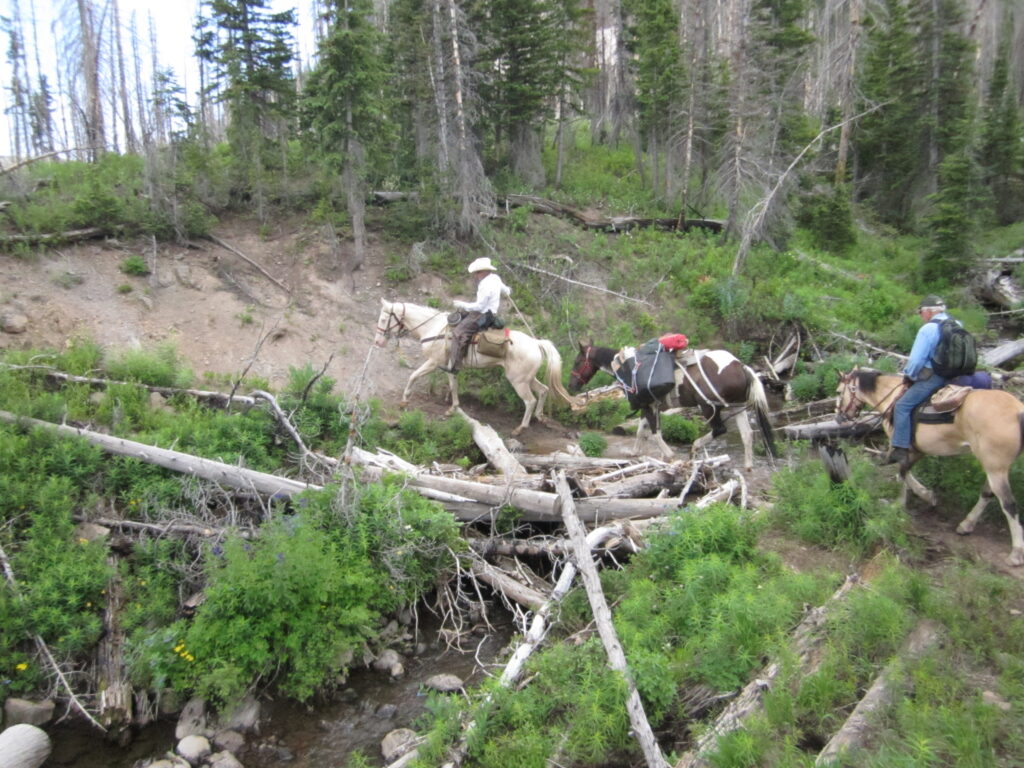
“It goes back to a couple of things that happened. I went to college in Hawaii. A situation developed, and I gained a lot of self confidence from it. When I came back to Colorado, I had always wanted to play football at the University of Colorado. So, I walked on for spring ball as a fourth-year senior. I made the team. When it came time to vote on captains, the coach wrote the names of all of the seniors on a board. He asked if he’d missed any seniors. I raised my hand. They knew I was older, but they had no idea I was a senior. I was No. 2 on the depth chart. The defensive backs coach called me into his office and asked what I thought I was doing. I said, ‘I’m trying to make the football team.’ He repeated the same question three more times, each time louder than the last. He said, ‘I have you penciled in as a starter, but there was no sense in me coming back out if I didn’t have more eligibility. There were younger guys who had similar skills with more years of eligibility. It didn’t make sense to play me over them. But I had the skills to do it even though people always told me I was too small. It changed my life. If there’s something I think I can do, I’m going to go for it. Maybe I won’t be successful every time. But more times than not, I guess I have been.”
How would you describe your artistic style?

“I call it Fine Art in Wood. It’s blending details of wood-carving and fine painting. When I reached a certain level of skill, I thought I could get in shows. I had shows turn me down. They said they don’t consider it art as much as a craft. It beat me down and frustrated me. After a year or more of thinking that way, I said, ‘I don’t agree with them. I’m going to break the mold.’ Now I’m getting invited to more and more shows to sell carvings and art work.”
What is an example of a piece of art in the Pack-Horse Adventure Collection?

“There’s one called Crossing the Creek. It’s actually about a ride I did with my brother-in-law. It was his first ride, and he asked if he could lead the pack horse for a little while. I told him how to do it. We got to a small creek, and his horse stepped across the creek. The pack horse stopped. He got dumped in the ditch in the creek. That was great fun.”
The “Pack-Horse Adventure” Collection by Don Woodard
This bas-relief, mixed media collection is hand-carved and features actual leather reins on each riding horse and a fabric lead rope on each pack horse. This Collection is carved from Linden wood, each work is matted and framed, and the frames are various sizes, ranging from 22”x 31.5” up to 26.5”x 31”.
Trail to the Top– This image shows a rider, crossing over a stream, high in the Rocky Mountains, riding to the top of the Flat Tops Wilderness, with his pack horse loaded with gear and supplies.
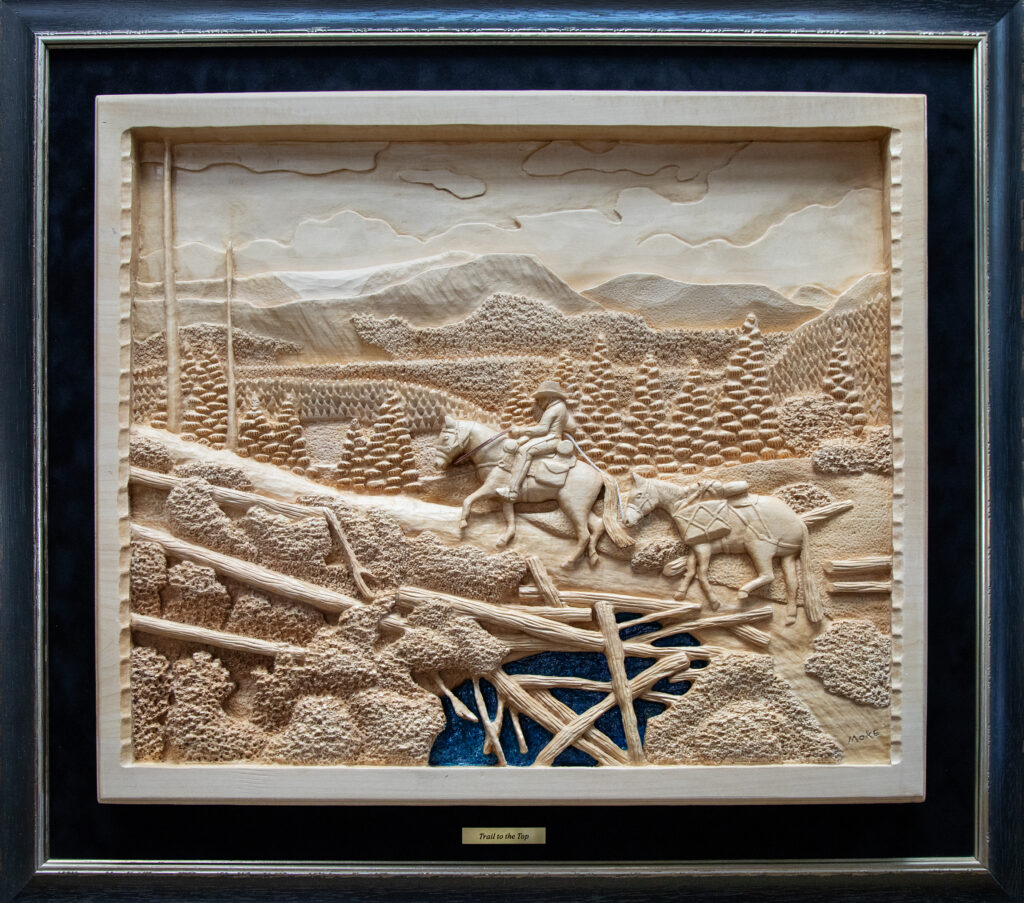
Pack Adjustment– This image shows a cowboy adjusting the pack on his pack horse. When riding in the mountains it is important to stop and check the pack occasionally, making sure that everything is tight, to prevent injury to the pack horse. The ridge in the background is known as the Chinese Wall, which we ride to the top of.
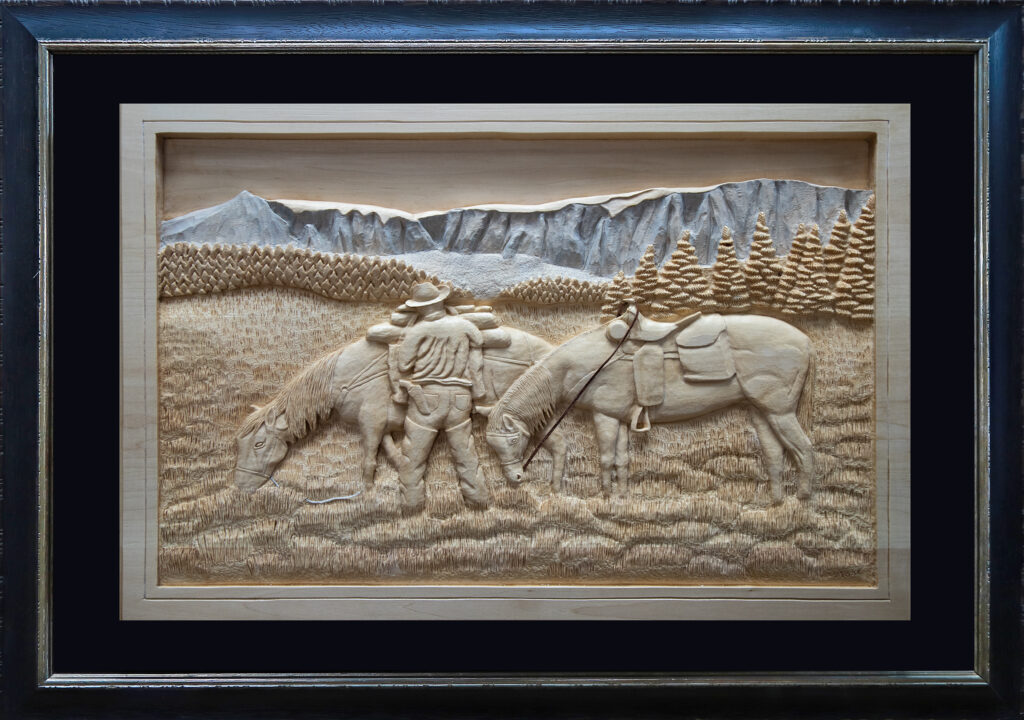
Wilderness Camp– This image represents a rider arriving at the camp site, while the tent is being set up. This could be a hunting or fishing camp, possibly a scene from the days of prospecting, or simply a camping trip.
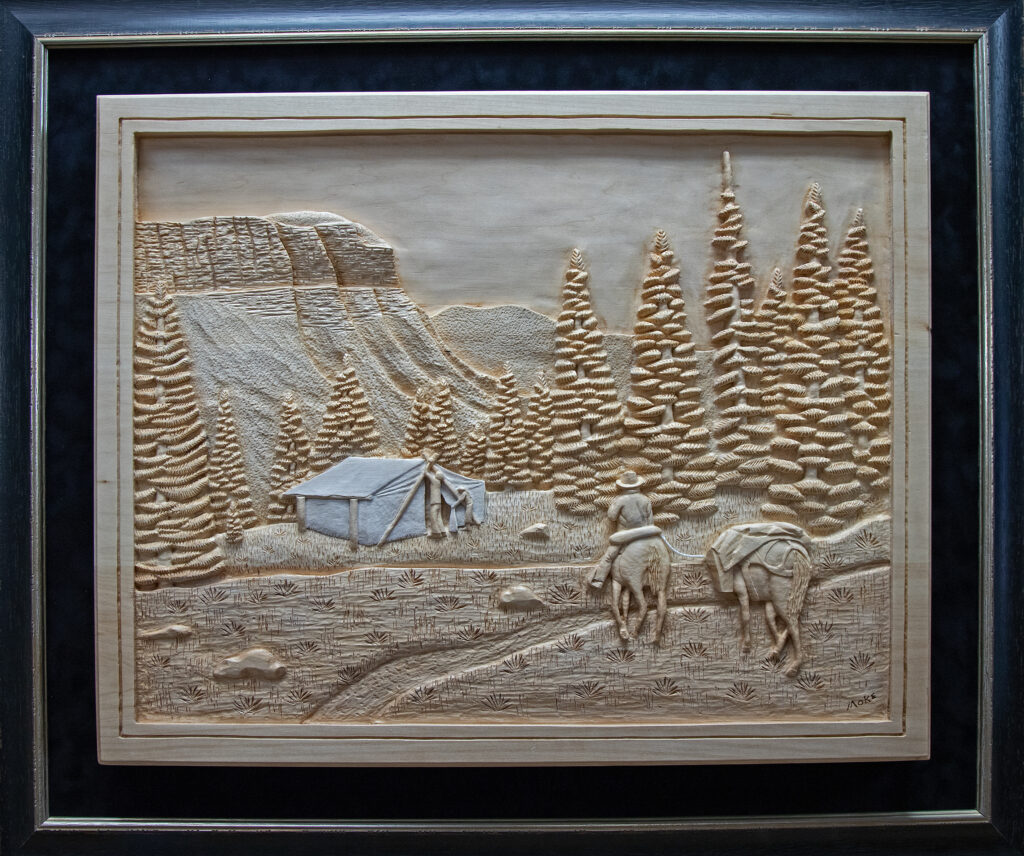
High Mountain Meadow– This image depicts a guy letting the horse feed on the high mountain grasses, either for breakfast, or after a long days’ ride.

Creek Crossing– This image represents a rider crossing a creek, leading his pack horse, without the pack. This scene was inspired from the event when my brother in-law from Texas joined us for our ride. He asked if he could lead the pack horse, so I gladly said yes. I and gave him instructions on how to create a loop with the lead rope, and should the pack horse slow down or come to a stop, he can place the loop over the saddle horn to help pull the pack horse along. When we came to a small creek, his horse stepped over the creek and instead of placing the loop over the saddle horn, he quickly wrapped the lead rope around the saddle horn. When the pack horse stopped, his horse turned sideways and the pack horse caused his saddle to rotate, dumping him into the creek with a big splash.

Snow-Drift Detour– This image represents our group heading down the mountain after a week-long riding adventure. We came to a large snow drift covering the trail, allowing us to pass with only a couple of feet of space between the snow drift and a two hundred foot drop off.


